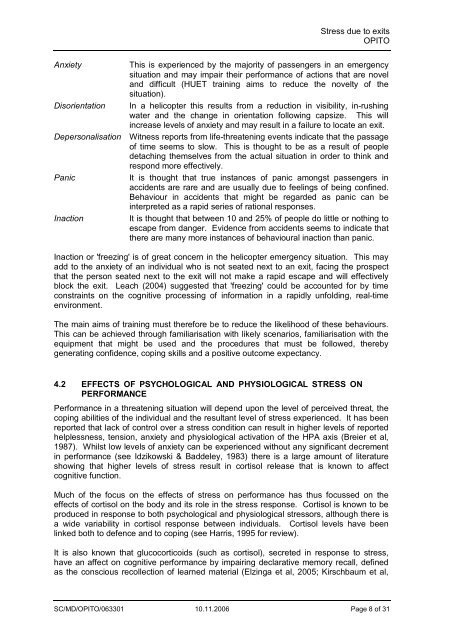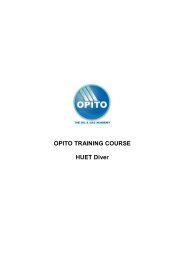Stress levels associated with huet - Opito
Stress levels associated with huet - Opito
Stress levels associated with huet - Opito
You also want an ePaper? Increase the reach of your titles
YUMPU automatically turns print PDFs into web optimized ePapers that Google loves.
<strong>Stress</strong> due to exits<br />
OPITO<br />
Anxiety This is experienced by the majority of passengers in an emergency<br />
situation and may impair their performance of actions that are novel<br />
and difficult (HUET training aims to reduce the novelty of the<br />
situation).<br />
Disorientation In a helicopter this results from a reduction in visibility, in-rushing<br />
water and the change in orientation following capsize. This will<br />
increase <strong>levels</strong> of anxiety and may result in a failure to locate an exit.<br />
Depersonalisation Witness reports from life-threatening events indicate that the passage<br />
of time seems to slow. This is thought to be as a result of people<br />
detaching themselves from the actual situation in order to think and<br />
respond more effectively.<br />
Panic It is thought that true instances of panic amongst passengers in<br />
accidents are rare and are usually due to feelings of being confined.<br />
Behaviour in accidents that might be regarded as panic can be<br />
interpreted as a rapid series of rational responses.<br />
Inaction It is thought that between 10 and 25% of people do little or nothing to<br />
escape from danger. Evidence from accidents seems to indicate that<br />
there are many more instances of behavioural inaction than panic.<br />
Inaction or 'freezing' is of great concern in the helicopter emergency situation. This may<br />
add to the anxiety of an individual who is not seated next to an exit, facing the prospect<br />
that the person seated next to the exit will not make a rapid escape and will effectively<br />
block the exit. Leach (2004) suggested that 'freezing' could be accounted for by time<br />
constraints on the cognitive processing of information in a rapidly unfolding, real-time<br />
environment.<br />
The main aims of training must therefore be to reduce the likelihood of these behaviours.<br />
This can be achieved through familiarisation <strong>with</strong> likely scenarios, familiarisation <strong>with</strong> the<br />
equipment that might be used and the procedures that must be followed, thereby<br />
generating confidence, coping skills and a positive outcome expectancy.<br />
4.2 EFFECTS OF PSYCHOLOGICAL AND PHYSIOLOGICAL STRESS ON<br />
PERFORMANCE<br />
Performance in a threatening situation will depend upon the level of perceived threat, the<br />
coping abilities of the individual and the resultant level of stress experienced. It has been<br />
reported that lack of control over a stress condition can result in higher <strong>levels</strong> of reported<br />
helplessness, tension, anxiety and physiological activation of the HPA axis (Breier et al,<br />
1987). Whilst low <strong>levels</strong> of anxiety can be experienced <strong>with</strong>out any significant decrement<br />
in performance (see Idzikowski & Baddeley, 1983) there is a large amount of literature<br />
showing that higher <strong>levels</strong> of stress result in cortisol release that is known to affect<br />
cognitive function.<br />
Much of the focus on the effects of stress on performance has thus focussed on the<br />
effects of cortisol on the body and its role in the stress response. Cortisol is known to be<br />
produced in response to both psychological and physiological stressors, although there is<br />
a wide variability in cortisol response between individuals. Cortisol <strong>levels</strong> have been<br />
linked both to defence and to coping (see Harris, 1995 for review).<br />
It is also known that glucocorticoids (such as cortisol), secreted in response to stress,<br />
have an affect on cognitive performance by impairing declarative memory recall, defined<br />
as the conscious recollection of learned material (Elzinga et al, 2005; Kirschbaum et al,<br />
SC/MD/OPITO/063301 10.11.2006 Page 8 of 31




